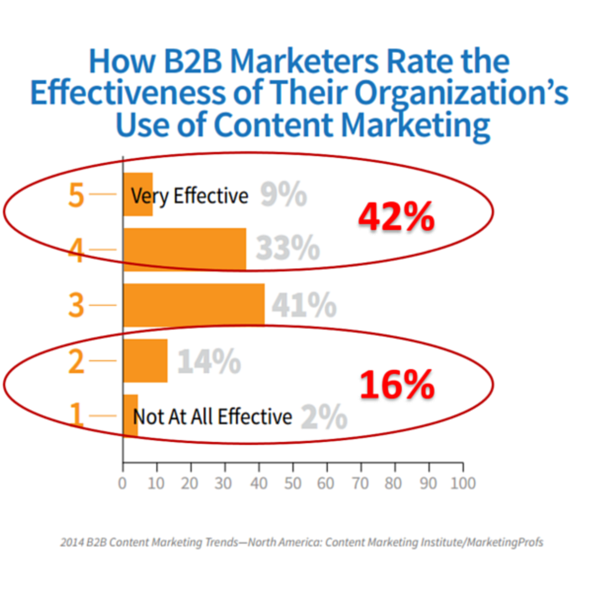
By Eric Wittlake, {grow} Contributing Columnist
You’ve seen the CMI content marketing research stat: only 42% of B2B marketers believe they are effective at content marketing.
Often, it is paired with a statistic like 93% of all B2B marketers use content marketing or 73% are producing more content than they did a year ago.
What’s going on here? Low confidence in success. High commitment to spending more. Are content marketers recklessly rushing deeper into content marketing?
But are they really? What should we really think of this “42% of marketers believe they are effective at content marketing” statistic? Let’s put this statistic back in its proper context.
1. Very few lack faith in content marketing
Do marketers really believe their content marketing is ineffective? According to the same CMI study, only 16% of B2B marketers believe their content marketing is not effective! Let’s put this another way: content marketers are more than 2.5 times more likely to believe they are effective than ineffective. In a category developing and changing this rapidly, that’s an impressive ratio.

While 16% believe they are ineffective at content marketing, 25% of them are not increasing the amount of content they produce and 33% are not increasing their budgets. In contrast to the way the CMI study has been spun by many others, content marketers are not recklessly rushing ahead. Many are actually holding back.
2. 42% actually isn’t low!
How confident should we really expect marketers to be in content marketing? Content marketing in its current form is still a young and quickly changing discipline. To put it into context, what do marketers think of other channels or activities?
- Only 37% of marketers believe their Facebook advertising is effective. (Source)
- According to Adobe, only 29% of marketers have confidence in their own measurement of digital marketing. (Source)
- 33% of marketers believe online banners don’t work, compared to just 16% percent that believe their content marketing isn’t effective. (Source)
This isn’t just an issue in marketing. In a survey of 1,000 IT professionals by Cisco, 77% believed their current security policies needed improvement and updating. That is 77% who likely would say the policy isn’t effective today and needs to be changed.
Versus other measures of confidence in newer marketing channels, 42% looks high, not low!
The pace of change alone should give many marketers pause when asked if they are effective content marketers: are you still effective in the face of shifting competition for attention and changing audience preferences? Have you mastered the new channels and communication formats your audience has shifted to, like Instagram, SnapChat or WeChat?
Despite this shifting landscape, 42% of B2B marketers are confident they are still effective and only 16% believe they are or have become ineffective!
3. Content measurement is imperfect
Content often meets multiple objectives. You may measure leads and traffic. However, content may also be improving customer service, brand perception and understanding of your offerings. Many of the potential benefits are generally not measured. When we only measure some of the benefits but all of the costs, we will question effectiveness. We will tend to undervalue our efforts. And yet, 42% are still confident in their effectiveness.
No, content marketing does not have a confidence problem.
What you can do
If you write or speak about content marketing, stop mis-using this 42% statistic and give your fellow marketers the credit they deserve. And if you aren’t 100% confident that your content marketing is effective, take heart. It isn’t unusual and it doesn’t mean you somehow missed the memo detailing content marketing’s silver bullet.
 Eric Wittlake spends his days working with B2B marketers and (occasionally) shares his marketing views on his personal blog, B2B Digital Marketing. You can find him on Twitter (@wittlake) when he isn’t working with B2B marketers.
Eric Wittlake spends his days working with B2B marketers and (occasionally) shares his marketing views on his personal blog, B2B Digital Marketing. You can find him on Twitter (@wittlake) when he isn’t working with B2B marketers.


